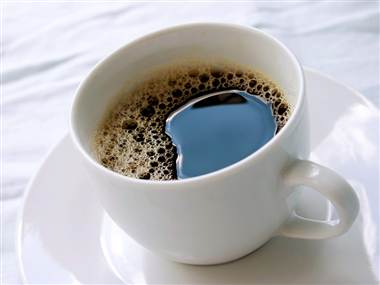Dr. Weeks’ Comment: Science is a methodology and even when the results fall against our “beliefs” we need to honor the process. Here we have two studies indicating that caffeine lowers risk of cancer. Caffeine is the item studied – not “cream and sugar” – so coffee black, a simple “cup a Joe”, now becomes worthy of the doctor’s consideration. Medical coffee, black coffee with the medicinal ganoderma or red reishi mushroom added is even more potent.
Caffeine Consumption Associated With Lower Risk For Basal Cell Carcinoma.
ABC World News (7/2, story 8, 0:25, Muir) reported that the “more coffee you drink, the less likely you are to get the most common type of skin cancer — basal cell carcinoma.”
For the study, published July 1 in the journal Cancer Research, “researchers analyzed data from the famous Nurses’ Health Study on more than 112,000 people,” the CNN (7/3, Wadas-Willingham) “Eatocracy” blog reports. “Investigators found the more someone drank caffeinated coffee, (more than two cups a day) the lower their risk of developing this form of cancer.”
A MyHealthNewsDaily piece posted to the MSNBC (7/3, Azvolinsky) “Vitals” blog pointed out, “Women who drank more than three cups of coffee daily were 21 percent less likely to develop basal cell carcinoma, compared with women who drank less than one cup of caffeinated coffee per month, the study showed. For men, this risk reduction was 10 percent.”
“The study also found that caffeinated tea, cola and chocolate also appears to reduce risk,” HealthDay (7/3, Gray) reports. In other words, according to the study’s lead author, “it’s the caffeine that’s most likely responsible for the beneficial effect.”
WebMD (7/3, Rubin) points out that the investigators “did not find an association between caffeine intake and risk of squamous cell skin cancer, although animal studies have suggested such a link.” However, “only 1,953 squamous cell cancers were diagnosed — compared to 22,786 basal cell cancers — so there might not have been enough cases to show a relationship to caffeine intake,” the study’s lead author explained. “With another 10 years of follow-up, though, he and his colleagues might observe a difference in squamous cell cancer risk between the highest and lowest levels of caffeine consumption,” he said.
According to MedPage Today (7/3, Bankhead), “Laboratory studies have consistently shown that oral and topical caffeine prevents” squamous cell carcinoma “in mice exposed to ultraviolet (UV) light, the authors wrote in their introduction. Other preclinical studies have suggested a potential mechanistic explanation, as topical caffeine has been shown to induce apoptosis in UV-damaged keratinocytes in mice.” Also covering the story is the CNN (7/3, Wadas-Willingham) “The Chart” blog in an entry identical to that of its “Eatocracy” blog.
Greater Coffee Consumption Associated With Lower Colon Cancer Risk.
A “Really?” feature posted to the New York Times (7/3, O’Connor) “Well” blog reports that recently, investigators “at the National Cancer Institute followed half a million Americans over 15 years. The researchers looked in detail at their diets, habits and health, and found that people who drank four or more cups of coffee a day — regular or decaf — had a 15 percent lower risk of colon cancer compared with coffee abstainers.” While the study authors “could not prove cause and effect, they did find that the link was dose-responsive: Greater coffee consumption was correlated with a lower colon cancer risk.” The study appeared June 13 in the American Journal of Clinical Nutrition.


Pingback: Ganoderma Yesterday and Today « Go Green Chicago